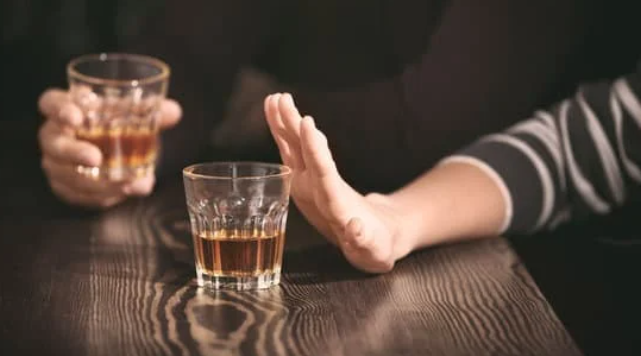If you’re reading this, you may be carrying a heavy ache in your heart, the ache of watching your daughter struggle with alcohol, and not knowing how to reach her.
You might be asking yourself: How do I talk to her without making things worse? What signs should I look for? Is there really a way forward for our family?
These questions are both painful and brave, and you’re not alone in asking them. The journey ahead isn’t easy, but it is possible, and there are real answers rooted in compassion and science.
With the right support, healing can begin for both you and your daughter. So, read on to discover hope, guidance, and the next steps you can take.

What is Alcohol Use Disorder (AUD)?
Alcohol Use Disorder affects 28.6 million U.S. adults each year!
Your daughter’s drinking isn’t a moral failing or a lack of willpower, it’s a medical condition. AUD is diagnosed using DSM-5 criteria based on 11 specific symptoms, ranging from mild to severe.
The condition increases risks for liver disease, cardiovascular problems, mental health issues, and accidents.
Every year, only 0.9% receive pharmacotherapy during treatment. This massive gap between need and care means families often become the primary support system by default.
5 Signs to Recognize When Help is Needed
Alcohol use disorder can often be avoided if you pay attention to the subtle cues.
Start by gently observing for warning signs, like: changes in her drinking patterns, missed work or social obligations, mood swings, or physical symptoms like tremors and frequent hangovers can all be signals that she’s struggling.
When to Seek Immediate Help?
Some red flags require urgent medical attention:
- Suddenly stopping heavy daily drinking
- History of withdrawal seizures or delirium tremens
- Mixing alcohol with other substances
- Pregnancy or planning pregnancy
- Suicidal thoughts or behavior
If you see these, please seek help right away. Your quick action could save her life.
Preparing for the First Conversation
Before approaching your daughter, take 60 seconds to ground yourself.
Place your feet flat on the floor, take four slow breaths, and remind yourself: “I will listen first, protect her dignity, and focus on safety.”
Choose a private, calm moment when neither of you is stressed or intoxicated. Have concrete resources: ready—phone numbers for treatment programs, your insurance information, and transportation options.
Your approach should follow Motivational Interviewing principles: express care, avoid judgment, and support her autonomy.
Start with something like:
“I care about you and I’ve noticed some things that worry me. Is now a good time to talk? I want to understand and support you.”
A Short Conversation Script for a First Talk
Starting this conversation can feel overwhelming, but having a gentle script in mind can help you approach your daughter with love and clarity.
Below, you’ll find a step-by-step example of how to open the door to honest, caring dialogue, even when emotions are high.
Initiating the Conversation
It’s important to set a calm, non-judgmental tone right from the start. Here’s one way to begin, letting your daughter know this comes from a place of love and concern.
| Speaker | Dialogue | Notes |
| Parent | “Hey, can we talk for a few minutes? I’ve been thinking about something important, and I want to share it with you. It’s coming from a place of love, and I’m not here to judge or blame.” | Sets a calm, loving, and non-judgmental tone. |
Child’s Initial Response
Your daughter may react in many different ways, curiosity, defensiveness, or even silence. Be prepared for any response, and remember that your steady presence matters most.
| Speaker | Dialogue | Notes |
| Child | (May respond with curiosity, defensiveness, or silence) | Observe and prepare for varied reactions. |
Stating the Concern (The “I’ve Noticed” Statement)
When you share your worries, focus on specific, observable changes rather than accusations. This helps your daughter feel seen, not judged, and keeps the conversation open.
| Speaker | Dialogue | Notes |
| Parent | “I’ve noticed some things lately that have made me worried, and it’s specifically about your drinking. For example, [insert 1-2 concrete, non-judgmental observations here – e.g., ‘I’ve noticed you’ve been missing more work/school lately,’ or ‘I’ve seen you seem really unwell after drinking,’ or ‘I’m concerned about the changes in your mood.’]” | Focus on objective observations, not accusations. |
Expressing Love and Offering Support
Let her know your concern comes from your heart. Emphasize that you’re not here to control her, but to support her well-being and explore options together.
| Speaker | Dialogue | Notes |
| Parent | “My heart aches seeing you struggle, and I just want you to feel better and be safe. I’m not here to tell you what to do, but I am here to help. Would you be open to talking about some options together, maybe just exploring what support could look like?” | Emphasize care and willingness to help, offering an open dialogue. |
Navigating Child’s Possible Responses
No matter how she responds, your goal is to keep the door open and show unconditional support. Here are some ways to respond with empathy and patience, whatever she says.
| Child’s Response | Parent’s Response | Notes |
| “I’m fine, you’re overreacting.” | “Thank you for telling me how you see it. I hear that you feel fine. I just wanted to share my concerns because I care deeply about you. I’ll check back soon. I’m here when you’re ready to talk more, no pressure.” | Acknowledge their perspective, reiterate care, and keep the door open without pushing. |
| “What do you mean? What options?” | “Well, there are different ways people get support, like talking to someone, or looking into programs that help with stress or anxiety. It doesn’t have to be a huge step, just a conversation. We could even look into it together.” | Provide gentle examples and offer to explore together. |
| “I don’t want to talk about this.” | “Okay, I understand. I just wanted to put it out there. My offer to help stands, and I’m always here for you. I love you.” | Respect their boundary for now, but reaffirm support and love. |
| “Maybe… I don’t know.” | “That’s okay to not know. How about we just look at some information together, no commitment? Or maybe you could think about it, and we can revisit it in a day or two? What feels like a small, manageable next step for you?” | Validate their uncertainty, offer low-commitment options, and empower them to choose a small next step. |
Remember, parents must:
- Lead with love, not judgment.
- Focus on observations, not accusations.
- Use “I” statements (“I’m worried,” “I’ve noticed”) rather than “You” statements (“You always,” “You never”).
- Be prepared for resistance. It’s normal.
- Keep the door open. This is often the first of many conversations.
- Offer help, don’t demand change.

How to Handle Pushback with Compassion?
Think “empathy plus structure.” Choose a calm moment, speak privately, and lead with love and observations, not accusations.
[You might say:
“I love you. I’m worried about your drinking because I’ve noticed [concrete examples]. I’m not here to blame, only to help you feel better and be safe. Would you be open to talking about options together?”
If she says,
“It’s none of your business,”
You might respond,
“You’re right that it’s your life and I respect that. I’m bringing this up because I love you and want to make sure you’re safe.”
If she minimizes the problem, (“I only drink socially”), gently say,
“I get it—sometimes it’s hard to see when it’s becoming a problem. Can I share a couple of things I’ve noticed as facts, not judgment, and you tell me what you think?”
When she feels judged, repair the relationship,
“I’m sorry you feel judged—that’s not my intent. I worry about you and want to understand your experience. Can we start over?”]
Ask open-ended questions, reflect what you hear, and avoid power struggles.
[If you hear:
“I’m fine,”
Acknowledge their view and keep the door open:
Say:
“Thank you for telling me how you see it. I’ll check back soon. I’m here when you’re ready.”]
How to Set Boundaries Without Losing Connection?
Boundaries protect both of you, while keeping your relationship strong.
Examples of Loving Boundaries
- Be specific and enforceable:
“I can’t give you money that might be used for alcohol, but I can help with groceries, bus passes, or calling a treatment program.”
- If she lives with you, establish clear household rules:
“You’re welcome to stay, but I won’t allow intoxicated driving or unsafe behavior. If you come home intoxicated, I’ll help you get settled safely and we’ll talk tomorrow.”
- For vehicle access:
“I can’t let you drive when you’ve been drinking because it’s not safe. I’ll arrange other transportation and we can discuss driving privileges when you’re sober.”
These boundaries are acts of love, not punishment.
What Are the Best Possible Treatment Options?
Finding the right treatment can feel overwhelming, but imagine the comfort of knowing your daughter is getting the exact support she needs.
Luckily, there are many different kinds of care available now, all made to gently guide her toward lasting recovery and a happier tomorrow.
Modern Alcohol Treatments:
Naltrexone and acamprosate are FDA-approved medications that significantly improve outcomes. Naltrexone reduces heavy drinking days, while acamprosate helps maintain abstinence after detox.
Psychosocial interventions like Motivational Interviewing and Cognitive Behavioral Therapy teach coping skills and relapse prevention. Combined medication and therapy approaches often work best.
Treatment intensity should match her needs:
- Outpatient counseling: For stable individuals with mild-moderate symptoms
- Intensive Outpatient Programs: For significant impairment requiring structured support
- Residential treatment: For unstable environments or high medical risk
- Medical detox: When withdrawal symptoms require supervision
How to Support Her in this Journey?
If she agrees to treatment, offer practical help. Drive her to appointments, help navigate insurance, or simply listen without trying to fix everything. Family therapy and support groups improve outcomes for everyone involved.

What to do when setbacks happen?
Expect setbacks. Relapse is common and doesn’t mean failure, it means the treatment plan needs adjustment. Stay calm, assess immediate safety, and re-engage with her treatment team.
How to Take Care of Yourself While Looking After Your Daughter?
Helping someone with alcohol problems is exhausting. Please remember to care for yourself, too.
Join support groups like Al-Anon for peer support, or SMART Family & Friends for practical skills training. CRAFT (Community Reinforcement and Family Training) teaches evidence-based strategies that increase treatment engagement.
Watch for Caregiver Signs of Burnout
- Chronic exhaustion
- Irritability
- Sleep problems
- Hopelessness
How to do Safety Planning at Home?
Being prepared for emergencies is one of the most loving and protective things you can do for your daughter and your family.
Keep naloxone (Narcan) available if your daughter uses other substances. Many street drugs now contain fentanyl.
Learn to recognize alcohol poisoning signs:
- slow or irregular breathing
- unconsciousness
- vomiting while passed out
- blue-tinged skin.
What to Include in a Safety Plan?
- Emergency contact numbers
- Nearest hospital with addiction services
- Transportation alternatives when she can’t drive
- Clear agreements about money, housing, and vehicle use
These steps are acts of love and protection.
Can This Approach Really Help?
Research shows that families using compassionate, evidence-based approaches achieve better outcomes than those relying on confrontation or ultimatums. Your relationship with your daughter is one of her strongest protective factors.
Recovery is possible. With the right combination of medical treatment, therapy, family support, and time, many people with alcohol use disorder go on to live fulfilling, healthy lives. Your role isn’t to cure her—it’s to love her consistently, maintain safety, and connect her with professional help when she’s ready.
The journey may be long and difficult, but you don’t have to navigate it alone. Professional treatment, family support groups, and evidence-based strategies can guide you both toward healing.
Conclusion
The journey of helping a loved one through Alcohol Use Disorder is deeply challenging, but it is a path filled with hope and the potential for profound healing.
Your unwavering love and commitment are powerful forces, and remember, you don’t have to navigate this complex road alone.
If you or your daughter are ready to explore treatment options and find the support you both deserve, please visit The Summit Wellness Group.
Our team is here to offer compassionate, evidence-based care that can light the way to recovery.
